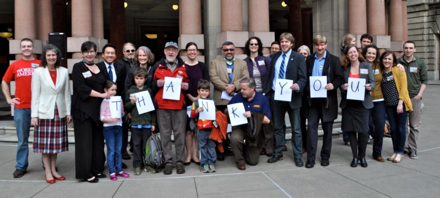Against Earned Sick Days? Try Waiting Tables With Torn Tendons In Your Leg
 For nearly a year, Ariel Kempf was a server at a very busy breakfast and lunch café in Portland when, one day, while playing with her dog on the beach, she tore several tendons in her right leg. She had no health insurance, so she went to an urgent-care clinic where she was told she couldn’t put pressure on her leg for at least ten days and that it might take up to six weeks to heal. She had no sick days.
For nearly a year, Ariel Kempf was a server at a very busy breakfast and lunch café in Portland when, one day, while playing with her dog on the beach, she tore several tendons in her right leg. She had no health insurance, so she went to an urgent-care clinic where she was told she couldn’t put pressure on her leg for at least ten days and that it might take up to six weeks to heal. She had no sick days.
Without delay, she called her coworkers who agreed to cover her next few shifts. She hoped to return in a week or so. But when the busy weekend came around and nobody was available to cover her shifts, her boss told her to come in and prove that she was “really injured.”
“He suggested I was lying,” Kempf, 35, said. “I was in disbelief. I had no health benefits or insurance from this job. So I had a $100 doctor’s note and no money coming in and I was still asked to prove to my boss that I had a valid injury. It was insulting.”
Not long after, Kempf joined Working America, which was part of a larger effort in Portland working to pass an earned sick days ordinance. The law, passed by the City Commission in March, allows workers to earn one hour worth of sick time for every 30 hours worked – for no more than five days per year. Kempf was one of 3,000 people who signed personal letters to city leaders urging them to pass the ordinance.

With the new law in Portland, some workers now have long-awaited relief. Yet 80 percent of low-income workers nationally can’t earn a single day of paid sick leave.
“In the food service industry, you’re really expected to come to work sick - to be there no matter what,” Kempf said. “If people had options I think it would relieve that tension and be better for all involved.”
“I joined this effort so that others don’t have to endure this type of treatment. Really, if I had been able to use sick days without these abusive repercussions, it would have been much easier to heal.”
The lack of earned sick days doesn’t just affect those in the food service industry; it also prevents parents from caring for their sick children, adding economic and personal stress to low-income families.
It’s been six months and Kempf is now back on her feet - literally and figuratively. She is in the process of starting her own business and works part-time to keep the bills paid. And, thanks in part to her hard work, including a testimony before the Portland City Commission, workers in Portland can now earn the sick days they deserve.
“If there’s one thing I know it’s that everybody gets sick and everybody deserves time to heal,” she said.


The views and opinions expressed in this post are those of the author(s) and do not necessarily reflect those of MomsRising.org.
MomsRising.org strongly encourages our readers to post comments in response to blog posts. We value diversity of opinions and perspectives. Our goals for this space are to be educational, thought-provoking, and respectful. So we actively moderate comments and we reserve the right to edit or remove comments that undermine these goals. Thanks!